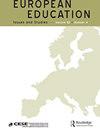外国出生的成年人参与教育活动:来自欧洲的证据
IF 0.9
Q4 EDUCATION & EDUCATIONAL RESEARCH
引用次数: 0
摘要
这篇文章表明,与生活在同一个国家的本土出生的成年人相比,在欧洲出生的外国成年人往往更少参与成人教育活动。然而,这主要是通过非正规教育的工作相关性质来解释的。在许多国家,外国出生的成年人往往比本土出生的成年人更多地参加正规成人教育。基于对经济合作与发展组织成人能力国际评估项目(PIAAC)数据的分析,本文表明,欧洲国家的参与率主要取决于成年人的受教育程度和是否有工作,总体参与率高的国家的外国出生成年人的参与率也较高。探索欧洲国家外国出生的成年人参加成人教育的情况是很重要的,因为众所周知,这些成年人在找工作和在新的国家背景下承认他们的外国证书方面感到困难。参加成人教育课程可以帮助他们学习新的或保持现有的技能。本文章由计算机程序翻译,如有差异,请以英文原文为准。
Foreign-Born Adults’ Participation in Educational Activities: Evidence From Europe
This article demonstrates that foreign-born adults in Europe tend to participate less in adult education activities compared to native-born adults living in the same country. However, this is mainly explained through the job-related nature of nonformal education. Foreign-born adults tend to participate more in formal adult education than native-born adults in a range of countries. Based on analyses using data from the Organization for Economic Cooperation and Development Programme on the International Assessment of Adult Competencies (PIAAC), this article shows that participation rates in European countries are mainly determined by adults’ educational attainment and having a job and that countries with overall high participation rates have higher participation rates among foreign-born adults as well. Exploring the participation in adult education of foreign-born adults in European countries is important, as it is known that those adults perceive difficulties in finding a job and having their foreign credentials recognized in the new country context. Participation in adult education courses might help them in learning new or maintaining their already existing skills.
求助全文
通过发布文献求助,成功后即可免费获取论文全文。
去求助
来源期刊

European Education
EDUCATION & EDUCATIONAL RESEARCH-
CiteScore
1.20
自引率
0.00%
发文量
5
期刊介绍:
uropean Education is published in association with the Comparative Education Society in Europe (CESE). It is an international peer-reviewed journal devoted to original inquiries and dialogue on education across the member states of the Council of Europe. Established in 1969, the journal features articles on education in individual member states, comparative studies on education across Europe, as well as the impact of European education initiatives globally. The journal especially encourages theoretical and empirical studies, interdisciplinary perspectives, and critical examination of the impact of political, economic, and social forces on education. European Education includes reviews of books and educational films, including those published/produced in English and other languages.
 求助内容:
求助内容: 应助结果提醒方式:
应助结果提醒方式:


